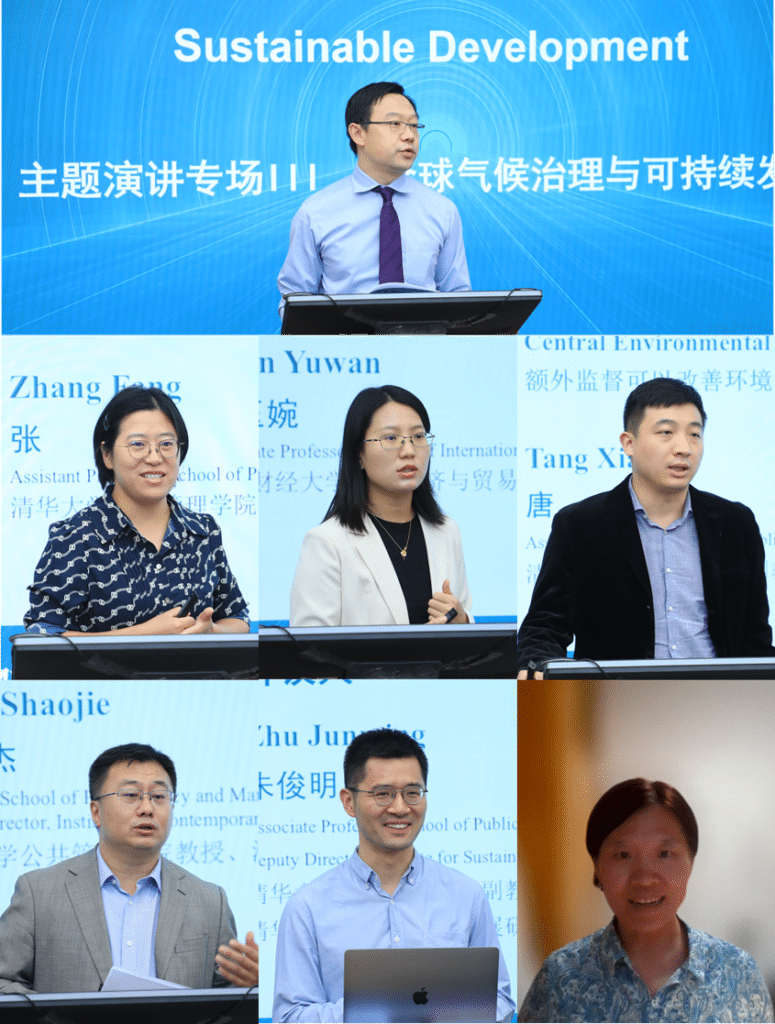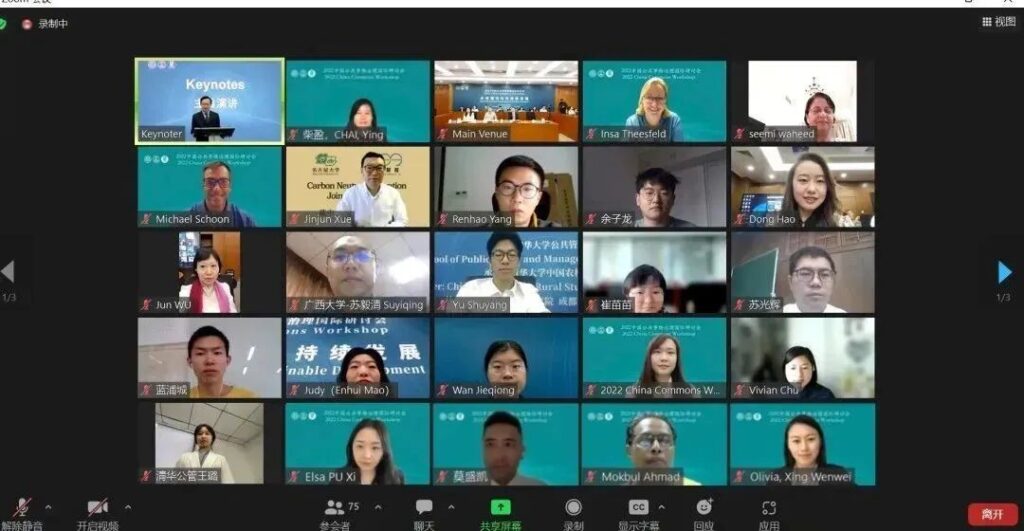
Participants of 2022 China Commons Workshop at Tsinghua University
On September 24, 2022, China Commons Workshop was successfully held both online and onsite at the School of Public Policy and Management, Tsinghua University (THU-SPPM) in Beijing, China. As the first professional conference of Commons in China, it is the fourth workshop since 2017, hosted by THU-SPPM, undertaken by the China Institute for Rural Studies of Tsinghua University, co-organized by Institute for Contemporary China Studies of Tsinghua University and Chengdu Institute of High Quality Development and chaired by Wang Yahua, Professor and Associate Dean of THU-SPPM. With the theme of “Rural Revitalization and Sustainable Development”, this Workshop brought together 30 speakers from 9 countries and regions, including opening ceremony, keynote speeches, three panels and closing summary, and more than 100 teachers and students from colleges and universities participated.

Tsinghua venue of 2022 China Commons Workshop, September 24
Insa Theesfeld, President of the International Association for the Study of the Commons (IASC) and Professor of Martin Luther Halle-Wittenberg University in Germany, and Wang Yahua, National Coordinator of the IASC China, delivered opening speeches.
As the Chairman of China Commons Workshop, Wang Yahua introduced in his opening speech that the original intention of the Workshop is to build a bridge between China and the World in commons studies. The exchange of ideas has been successfully through three sessions in the past few years and supported by the IASC. At present, sustainable development has become a key issue that cannot be ignored and needs to be solved urgently, and rural revitalization is an important part of sustainable development. Currently, the research on commons governance in China is booming in the direction of discipline, systemization and internationalization. “Introduction to Commons Governance”, the first Chinese textbook released in this year, has received much attention from Chinese academia. Wang Yahua expressed gratitude to all participants of this Workshop.

The opening speech by Wang Yahua
Insa Theesfeld, in her opening speech, thanked Professor Wang Yahua’s team for their efforts in successfully holding the Workshop. She elaborated on the mission and original intention of the IASC, which is committed to building bridges for scholars, practitioners and policy makers in different disciplines to work together to improve the good governance of commons and other shared resources. Insa introduced the organizational system, academic network and daily activities of IASC and reviewed the academic activities and organizational development of IASC since the last China Commons Workshop (2020). In addition to academic activities, IASC also strengthens the communication between the academic community and the outside world through podcasts and the International Journal of Commons (IJC). Finally, Insa announced the upcoming academic activities of IASC and wished 2022 China Commons Workshop a great success.

The opening speech by Insa Theesfeld
As the Vice Chairman of the Workshop, Gao Yuning (Associate Professor of THU-SPPM) presided over the keynote speech in the morning. 8 keynotes were delivered totally.

Gao Yuning moderated the keynote speech
Charles Schweik (Professor, University of Massachusetts at Amherst and President-Elect of the IASC) discussed the value of open-source intelligence in promoting rural revitalization and sustainable development from the perspective of intellectual property and openness, and encouraged researchers to consider the Model of open-source sharing in the context of China.

Keynote speech by Charles Schweik
With a brief review of the publications on the International Journals of the Commons in the past decades, Micheal Schoon (Associate Professor, School of Sustainability, Arizona State University and Editor-in-Chief of the IJC) pointed out that the international publication of commons ushered in an explosive growth with characteristics of interdisciplinary and multidisciplinary from 2008 to 2018.

Keynote speech by Michael Schoon
Liao Chuan (Assistant professor, Department of Global Development, Cornell University and Editor-in-Chief of World Development) summarized the contributions of commons studies to sustainable development research, and introduced the important value of the application of spatial data science in promoting polycentric governance and sustainable development.

Keynote speech by Liao Chuan
Quentin Grafton (Professor, Crawford School of Public Policy, Australian National University) discussed water governance through Ostrom’s eight principles and summarized the basic water justice pathways.

Keynote speech by R. Quentin Grafton
Xue Jinjun (Professor and Director, Sinocarbon Carbon Neutral Innovation Joint Laboratory, Nagoya University) summarized the international progress and prospects of carbon peaking and carbon neutrality, and proposed a Low-carbon Flying Geese Model that developed countries help developing countries to optimize carbon emission.

Keynote speech by Xue Jinjun
Eduardo Araral (Professor, Lee Kuan Yew School of Public Policy, National University of Singapore) summarized the overall progress of international commons studies in the past decades, and analyzed the connection and difference between regional and global commons governance.

Keynote speech by Eduardo Araral
Luo Jar-Der (Professor, School of Social Science, Tsinghua University) proposed a Chinese model of self-organization and self-governance which shows the important role of elites (the “able persons” in Chinese) in the process of self-organization. Then, he takes Beijing Dashilar as an example to verify the model.

Keynote speech by Luo Jar-Der
Mansee Bal Bhargava (Council Member of the IASC) analyzed the issue of sustainable development in rural India, pointing out that the sustainable development of the countryside is being eroded by the unsustainable development of urbanization, which, further, leaded to a reconsideration of past urbanization route.

Keynote speech by Mansee Bal Bhargava
The speeches in the afternoon encompassed three special panels: “Institutional Analysis and Rural Governance”, “Rural Revitalization Practices at Home and Abroad” and “Global Climate Governance and Sustainable Development”, showing the hot topics and progress of the localization of commons governance studies in China.
Wang Yahua presided over Panel I “Institutional Analysis and Rural Governance”. In this panel, Professor Tan Rong (Associate Dean, School of Public Affairs, Zhejiang University) discussed the “Archetypes” method at the forefront of institutional analysis and explained the collective actions in the adjustment of the ownership of rural land consolidation. Chai Ying (Professor, Guangdong University of Finance and Economics) reviewed the theory of adaptive governance of agricultural water resources and shared the exploration of agricultural water resources governance to adapt to climate change. Zang Liangzhen (Associate Research Fellow, Institute of Agricultural Economics and Development, Chinese Academy of Agricultural Sciences) analyzed how land fragmentation and land adjustment affect the governance of rural commons. Su Yiqing (Assistant Professor, School of Public Policy and Management, Guangxi University) used the knowledge system of commons research to explain the tragedy of the rural tourism and how to achieve the dynamic governance of the rural tourism industry through institutional changes. Wang Xiaoli (Associate Professor, Department of the Social and Ecological Development, Party School of the Central Committee of CPC) and Chen Sicheng (Associate Research Fellow, China Institute for Rural Studies, Tsinghua University), as discussants, conducted in-depth reviews on the speeches.

Panel I “Institutional Analysis and Rural Governance”
Dai Yao (Assistant Research Fellow, China Institute for Rural Studies, Tsinghua University) presided over panel II “Rural Revitalization Practice”. The “Hong Kong Rural Revitalization Team” of Tsinghua University, composed of EMPA and MPA graduate students from the THU-SPPM, showed their story on how to solve dilemmas of rural governance and achieve rural revitalization in Lai Chi Wo Village (Hong Kong) by using IAD framework and collective action theories. Mokbul M.Ahmad (Professor, Head of Department of Development and Sustainability, Asian Institute of Technology), Vivian Chu (Lecturer, Centre for Civil Society and Governance, the University of Hong Kong) and Li Xin (Vice Director, International Poverty Reduction Center in China) participated in the case reviews as discussants.

Panel II “Rural Revitalization Practice”
The Panel III “Global Climate Governance and Sustainable Development” was presided over by Gao Yuning. In this panel, Zhang Fang (Assistant Professor, THU-SPPM) took the Belt and Road Initiative as an example to answer questions such as whether clean energy has achieved South-South transfer and etc. Duan Yuwan (Associate Professor, School of International Trade and Economics, Central University of Finance and Economics) shared the test results of the welfare effects of China’s carbon market and the EU Carbon Border Adjustment Mechanism (CABM). Tang Xiao (Associate Professor, THU-SPPM) jointly analyzed the question of whether additional supervision can improve environmental performance from a theoretical model and an empirical level. Zhou Shaojie (Professor, THU-SPPM and Deputy Director, Institute for Contemporary China Studies, Tsinghua University) introduced the progress of Chengdu’s practice of promoting green development. Zhu Junming (Associate Professor, THU-SPPM and Deputy Director, Institute for Sustainable Development Goals, Tsinghua University) and Ren Xiaona (Associate Professor, Beijing University of Agriculture) as discussants, had in-depth reviews on the speeches.

Panel III “Global Climate Governance and Sustainable Development”
In the closing summary, Wang Yahua pointed out that around the theme of this Workshop, global scholars from various fields contributed a wide range of researches, which greatly reflected the application and development of Ostrom’s scholarship, and demonstrated the long-standing intellectual tradition in governing the commons. The Workshop reflected not only the overall progress and cutting-edge trend of the knowledge development of commons but also the efforts and practices of the localization of the commons studies. Wang Yahua finally announced the recent important activities of IASC and expressed thanks again to all the guests.

Closing summary by Wang Yahua
China Commons Workshop has been successfully held for four times. 2022 China Commons Workshop reflected the latest dynamics in commons governance studies in China and promoted intellectual exchanges among global communities in commons studies.

Part of online participants